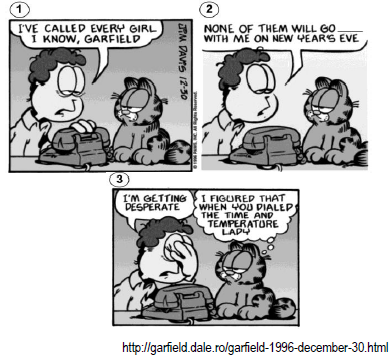Questões de Vestibular
Sobre aspectos linguísticos | linguistic aspects em inglês
Foram encontradas 170 questões
Texto
When superyacht chic meets hybrid technology
By Eoghan Macguire, for CNNAutor


(Disponível em: <http://edition.cnn.com/2012/05/15/tech/hybrid-superyacht/index.html?hpt=itr_tl>
According to the text it is correct to affirm that
the words “emissions” (line 8), “consumption”
(line 9), “production” (line 16), “completion” (line
18), and “performance” (line 36) are all nouns
which respectively derive from the words “emit”,
“consume”, “product”, “complete”, “perform” and
“maintain” which are all verbs.
Texto
When superyacht chic meets hybrid technology
By Eoghan Macguire, for CNNAutor


(Disponível em: <http://edition.cnn.com/2012/05/15/tech/hybrid-superyacht/index.html?hpt=itr_tl>
According to the text it is correct to affirm that
the words “boating” (line 1), “gas-guzzling” (lines
2 and 3), “generating” (line 24), “entering” (line
28) and “taking” (line 33) are all verbs in the
ING form functioning as adjectives.

SCHULZ. Peanuts. Speak up. São Paulo: Peixes, 2006. p. 49.
“If there’s anyone in this world I do trust, it’s my mother!” (6th picture)
The verb do in this sentence is being used

EVANS, Stephen. Disponível em: <www.bbc.co.uk/worldservice/learningenglish/language/wordsinthenews/2011/05/110518_witn_electric_cars_page.shtml>. Acesso em: 2 jun. 2011.
TEXTO:



BRYANT, Nick. Record blow for teenage sailor. Disponível em:<www.bbc.co.uk/worldservice/learningenglish/language/wordsinthenews/2010/05/100505_witn_sailing.shtml>. Acesso em: 5 jun. 2010.



LONG, Gideon. Earthquake science. Disponível em: <www.bbc.co.uk/worldservice/learningenglish/language/wordsinthenews/2010/03/100405_witn_earthquake_science.shtml>. Acesso em: 6 jun. 2010.


Leia atentamente o texto abaixo para responder à questão.

TEXTO I
Little Boy: What does your Daddy do?
Little Girl: Whatever my Momma tells him.
(JANSSEN, Arlo T. International Stories.
New Jersey: Prentice-Hall, 1981.)
TEXTO II
George: Which candidate is your wife going to vote for?
Herman: Oh, she’ll vote for the same one I do.
George: Which one is that? Herman: I don’t know yet. She’s going to tell me
tomorrow.
(JANSSEN, Arlo T. International Stories.
New Jersey: Prentice-Hall, 1981.)
You Can Blame the Bugs
The West epitomizes individualistic, do-your-own-thing cultures, ones where the rights of the individual equal and often trump those of the group and where differences are valued. East Asian societies exalt the larger society; behavior is constrained by social roles, conformity is prized, outsiders shunned. […] But the reason a society falls where it does on the individualism-collectivism spectrum has been pretty much a mystery. Now a team of researchers has come up with a surprising explanation: disease-causing microbes. Societies that evolved in places with an abundance of pathogens, they argue, had to adopt behaviors that add up to collectivism, for reasons of sheer preservation. Societies that arose in places with fewer pathogens had the luxury of individualism, which is less effective at limiting the spread of disease but brings with it other social benefits, such as innovation. […]
Written in March
The cock is crowing,


The relative pronoun “whom” (line 31) is used instead of “who” because it comes after preposition.
The following text refers to question:

Texto
The History of the Motion Picture
Who invented Cinema, the Camera, or Film?

(Adapted from a text available at
http://inventors.about.com/library/inventors/blmotionpictur
es.htm. Accessed on 02/6/2011, at 9h15min)
Choose the correct alternative according to the text.
The “ing” in the word “making” (line 10) forms a
noun, and the “ing” in the word “paying” (line 27)
forms an adjective.
Texto
A brief history of Facebook


(Adapted from a text available at
http://www.guardian.co.uk/techonolgy/2007/jul/25/media.
newmedia. Accessed on 02/6/2011, at 9h10min)
Choose the correct alternative according to the text.
The words “programmer” (line 3), “users” (line
43), and “founder” (line 51) all refer to someone
responsible for performing the actions related to
these verbs.
I. She would like me to speak to her mother.
II. We want he goes to England with us.
III. They asked that she study more.
IV. He would rather to traveling in winter.
V. I think people should avoid speaking too loud in public.

Muitos verbos em inglês consistem em duas partes: um verbo
“base” (tais como bring, take, go, come) acompanhados de uma
preposição ou de uma partícula adverbial (tais como up, down,
out, in, off). No segundo quadro da tirinha, foi retirada a palavra
que acompanha o verbo GO. A preposição que completa o
sentido do verbo na fala do personagem é


In the extracts “the ultimate get-away-from-it-all holiday” (lines 1-2) and “The out-of-this-world experience” (line 8), the underlined parts are used to describe the nouns that follow them.

